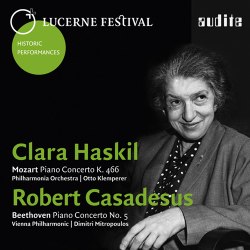|

|
Wolfgang Amadeus MOZART (1756-1791)
Piano Concerto No.20 in D minor, K466 (1785) [32:17]
Ludwig van BEETHOVEN (1770-1827)
Piano Concerto No.5 in E flat major, Op.73 Emperor (1809) [36:40]
Clara Haskil (piano)
Philharmonia Orchestra/Otto Klemperer (Mozart)
Robert Casadesus (piano)
Vienna Philharmonic Orchestra/Dimitri Mitropoulos (Beethoven)
rec. 8 September 1959, (Mozart) and 1 September 1957 (Beethoven), live, Kunsthaus, Lucerne
AUDITE 95.623 [69:02]
Performances given at the Lucerne Festival are now being released by Audite and they look like becoming a historically significant series of discs, even given the raft of broadcast material currently circulating from the archives of European broadcasting stations and festivals. This one concentrates on performances given in 1957 by Robert Casadesus in Beethoven’s Emperor Concerto, and by Clara Haskil in Mozart’s D minor Concerto K466 two years later. Not the least of the many distinctive features of the disc is the nature of the collaborations: Haskil with Klemperer and the Philharmonia, Casadesus with Mitropoulos and the Vienna Philharmonic.
Haskil had first performed the C minor in 1942, when she was already 47, and had just had an operation for a brain tumour. In 1960 she recorded it with Igor Markevitch and the Orchestre des Concerts Lamoureux, so this Klemperer encounter took place the year before her LP was released. Other examples of her way with the concerto appeared subsequently - it was a work that became very much associated with her, and there’s the Swoboda-directed disc on Westminster for example - but the Lucerne performance with Klemperer preserves a reading of the utmost refinement and beauty on the pianist’s part. She wrote in a letter that the performance had been for her ‘unforgettable’ and it features the Philharmonia’s wind soloists on their best, and most tonally responsive form, as they answer and taper their phrases and exchanges with the solo piano with great distinction. There’s a serious playfulness at work; Haskil dispatches her own first movement cadenza splendidly. The fluid yet purposeful slow movement comes over very well, despite one or two balancing disparities. Klemperer is a more emphatic conductor than Markevitch, not least in the finale, but the ensemble between himself and his soloist is first-class throughout, and buoyancy, once established, is properly maintained.
In the same way that Haskil was much admired for her Mozart, so Casadesus was not short of opportunities to set down his versions of the Emperor. Newton Classics has recently restored the recording he made with Hans Rosbaud, but you can also find studio and live versions elsewhere; there’s Medici broadcast directed by Christoph von Dohnányi amongst them, for example, and indeed a New York performance with Mitropoulos himself. Casadesus is a good foil to Haskil; his sensitive masculine extroversion to her introspective but not feline responses. If you’re looking for a perfect balance, finger-perfect pianism and a rock-solid ensemble, you won’t quite find it in this Emperor. If however you want a really exciting, risk-taking and spontaneous-sounding traversal of a warhorse, then you will certainly find it here. Nothing is taken for granted, by either soloist or conductor. The music making is communicative and also, in the slow movement, thoughtful and expressive. The highlight, though, is surely the finale, where a joie de vivre so hard truly to experience suffuses the performance. Casadesus is audacious, brilliant, exciting; Mitropoulos partners him every inch of the way, bringing the Vienna Philharmonic with him for a whirlwind and exhilarating ride.
A conventional concerto pairing is thus brought thoughtfully to life through the interpretative differences of their protagonists. This is a really outstanding start to the series.
Jonathan Woolf
Previous review: John
Quinn
Masterwork Index: Beethoven piano concerto 5 ~~ Mozart piano concerto 20
 |
 |
|











